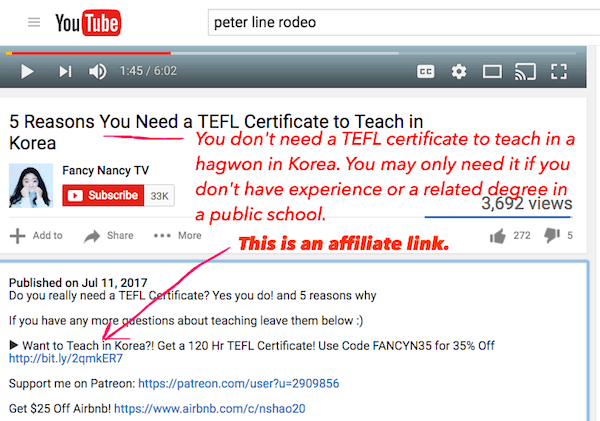Some TEFL/TESOL course providers use some of the same marketing tactics to get you to BUY. Have you been to many TEFL course sites? I'll bet if you have that you'll probably start to think that they all look alike.
Some of these marketing tactics can be a bit scammy, tell a half-truth or worse case scenario straight out lie. The TEFL industry is a revolving door and those that are coming in that door haven't much of an idea what it's actually like to teach or live abroad.
If this is you then you are placing a lot of trust into TEFL/TESOL companies.
I have been through the door where you are now probably standing. I have been both a buyer and a seller of TEFL courses. So now I'd like to share with you some of these marketing tactics that many courses use.
Tactics & that some TEFL course providers use to get you to buy
Here is a list of marketing and advertising tactics that some TEFL course providers use. These not only refer to TEFL, but also to TESOL and CELTA providers.
- It's required
- Guaranteed jobs
- You'll get a better job
- Employers want "our" TEFL certificate
- It's really competitive nowadays
- Have the experience of a lifetime
- Exotic locations
- Travel and see the world
- Internationally recognized
- Accredited TEFL courses
- Teach anywhere in the world
- Massive "discounts" and "sales"
- Fake reviews
1. You need it - it's required

Some TEFL course providers and affiliates (like above) will tell you that you "need" a TEFL certificate to teach English abroad which is often a lie. In some cases you do need it, but you don't usually need a certificate to get a legal teaching job in much of Asia.
Some schools could prefer it especially if you don't have experience, but the majority of the time it's not needed to get a work visa. You do usually need to have a degree and to be a native speaker to get a job.
I even found a case of a CELTA provider lying about the requirements. Which is funny as CELTA is considered the holy grail of TEFL courses.
I have seen some of the biggest companies tell this lie. In fact the company where I got my TEFL certification from told me I needed it to teach in Taiwan and in Korea.
Well, years later I taught in both of those places and I can tell you that it is not a "legal requirement" most of the time. In Taiwan if you have an associates and a TEFL you can teach, but if you have a bachelor's degree you don't need a TEFL to legally work there.
2. Guaranteed jobs
"TEFL guaranteed job placement" is a common one. Some TEFL/TESOL courses offer this. They say if you complete their course then you're guaranteed a job - through them.
They may offer this and it may help you. But, the course I took offered some "guaranteed jobs" through their website, but you don't need this and here's why...
A course can only offer you a small share of all the jobs that are out there. You'll find far more variety on other sites than you will on theirs. It could be a helpful service, but I wouldn't choose a course because of it. The course I took had very few jobs especially in places where I wanted to teach. In my opinion it's not worth it and don't choose a course because of this.
I believe this is a tactic that's used to prey on your fear of teaching abroad. You're looking for security and guarantees, which don't really exist in this world.
Comments from Reddit
"I did a TEFL course with them a few years ago, the person I talked to told me that if I did an intensive classroom course with them they could set me up with an EFL job in Thailand through one of their contacts.
I did the course, got in touch with them and this time they told me that I didn't have the necessary qualifications and I had to do another online course.
I did that course, got in touch with them and they then told me they didn't have any positions in Thailand, but could get me a job in China if I did another course, or they could send me their list of contact schools in Thailand, which turned out to just be a directory of public schools in the country." - AtomicMonkeyTheFirst
"I've finished my 120-hour UK TEFL course I've been absolutely lost with regards to finding work. The jobs board provided by TEFL has little work on offer in Korea, and the few jobs it does have don't seem to be quality..." - harryrobertparker
"I'm just dissapointed because when I talked with the counselor he made it seem like they were going to help me step by step the whole time which is partly why I got it. But besides the actual class they've been no help at all. - pepper1717
3. You'll get a more "reputable" job
Unless you're getting a very high level certificate, such as a CELTA, DELTA or Trinity TESOL, this is not likely to happen. And even having a CELTA, DELTA or other advanced TEFL certificate doesn't guarantee anything. For example, you could still have a CELTA and have a pretty mediocre job.
A lot of people have TEFL certificates and even more importantly teaching experience. In my experience I wasn't granted any better jobs than my non-TEFL touting friends.
I have heard some TEFL course providers say that if you only have a degree you'll only qualify for an entry level job and that a TEFL/TESOL course will enable you to get a "reputable" job. Nonsense!
A whole lot of people are competing for relatively similar jobs. The qualifications that typically make a difference are certified (licensed) teachers, teachers who have master's degrees and years of experience.
Here is a "exploitative" quote from a TEFL provider's website:
"In addition, those lacking certification are often at a disadvantage since the jobs they are likely to find will be lower paying positions with schools at the low end of the market; these schools are more likely to offer exploitative working conditions.
All things being equal between you and the other competing job applicant then yes, a TEFL certificate could give you an edge, but so could good looks, a youthful appearance and charm.
TEFL certificates can be preferred, but there are other preferences.
4. Employers want "OUR" TEFL certificate

Some TEFL course providers out there say that some employers want their (company's name) certificate. In my experience that's mostly nonsense. Most employers in Eastern Asia don't know the difference between TEFL, TESOL, and CELTA. They will hardly recognize a difference between the myriad of course providers out there.
For the ones that do then they will know that the most recognized programs are CELTA, DELTA, and Trinity TESOL. You can see an example of this here.
5. It's really "competitive" nowadays
Some providers use the line that it's not like it used to be when you could just show up and get a job. They say that nowadays it's more competitive therefore you will need training and a certificate to get a job. I suppose it depends on the place and the school. But I see this as mostly hype.
Here is another quote from a popular TEFL course providers website:
"As the competition for desirable ESL teaching jobs has increased, language schools around the world are becoming more selective when hiring new teachers."
That's true, but...
Let's say you have a TEFL, TESOL or CELTA certificate and the other guy has a year of experience teaching in the country you are applying to. That school is most likely going to pick the teacher with experience.
Again this is fear based marketing.
6. You'll have the experience of a life time
You may very well have the experience of a lifetime or you may not like it at all. Some people struggle with culture shock. Some people don't like it and some people are just not cut out for it.
7. Exotic Beaches

I have seen this one on a number of TEFL course sites. You'll see an exotic beach somewhere in Thailand tempting you to come teach English abroad. It looks beautiful and it's enticing, but...
The thing is most people don't teach on a beach.
Most people don't teach anywhere near a beach. In Asia most people live and teach in a fairly densely populated city. Eastern Asia is a very populated place. It's very urban and there are many problems from the urbanization, pollution, and overcrowding.
While there are beautiful places to see. The fact is most people don't end up in those places. Most people end up in urban areas.
8. Travel and see the world!
It's not completely inaccurate. It can be a good way to have an experience living abroad. However, teaching abroad and traveling abroad are different. In my experience most teachers don't actually do a lot of traveling because they are mostly working. Sure you'll get to travel locally a bit.
But if you are working in a private academy (like a hagwon, buxiban, training center or eikaiwa) most teachers don't get much vacation time which only leaves the weekends, a few days here and there and then at the end of the year.
Mostly it's more of an immersion in one country living a fairly routine life since you signed a contract and you have to work.
9."Internationally recognized"
By it's very nature a TEFL certificate is sort of recognized world wide. The F in TEFL stands for foreign so many schools will accept it. Yet don't get confused. It doesn't matter if you have a CELTA or any other certificate it's not necessarily a guarantee to get a job in "any school".
As I mentioned before the majority of employers out there cannot tell the difference between TEFL/TESOL/CELTA certificates. Many times any one is as good as the next one to them. You have to keep in mind that schools have preferences. The most important one is experience. Experience is a far better qualification in the minds of employers than any certificate is especially if it's in-country.
Read more about internationally recognized TEFL courses.
10. "Accredited" TEFL courses
Wait! I thought accreditation was a good thing? Well, there's more to accreditation than meets the eye and their so-called accreditation can be totally fake (example).
Accreditation should be a marker of quality, but there are a lof questions surrounding the accreditation such as who they actually are, what they actually do and the fact that there is an exchange of money.
There are courses out there that claim to be accredited when in fact they are not accredited by any real organization and they are only accredited by some so-called company that they created.
You might want to read more about TEFL accreditation or why accreditation doesn't work.
11. "Teach anywhere in the world"
Some use this slogan to advertise their courses. It's true that you can teach English in many countries, but you can't teach "anywhere" or in every school.
Take for example, Europe. If you're an American you are probably not going to have an easy time finding work in Western Europe. Schools there will first look for EU passport holders from the UK.
This is another big claim that isn't exactly true.
12. Massive "discounts" and "sales"

Many course providers use advertising that implies that you are going to get a massive discount. This sort of thing is used on other sites too. A good example of this is on Groupon.
Then there are the so-called limited time offers that seem to go on forever in actuality. Maybe not that one, but everytime I visit their site they have a sale going on. In this guy's review of i-to-i he mentions that.

It reminds me of the stores in Chinatown that have 50% off sale signs on the store year around. Or the stores with the "Going out of business" sign.
13. Fake reviews
There is an entire site and scheme out there all written by one person using multiple fake id's, fake awards, fake comments and lots of fake reviews. Real scammers are pretty smart. At least smart enought to fool the average joe. Here's an example.
And aside from a big scam like that there are also a lot of other fake reviews or highly biased reviews that you should look out for. The truth is that we are all biased, but some people lie, use deceptive tactics to write fake reviews or they are only writing the review because they are getting paid to do so.
Conclusion
I just showed you some of the more common tactics courses use to get you to buy. Sometimes they are lies and other times they are half-truths. But now you know more.
You may also like to read this article on the psychological tricks companies use to get you to buy.
